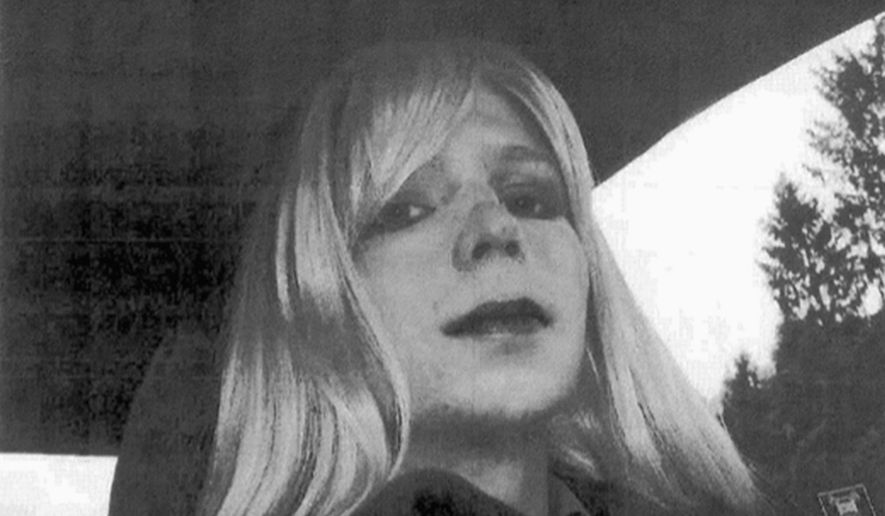OPINION:
The difference between real life, where most Americans live, and life inside the bubble, as President Obama described the place where many Democrats fled to, has never been illustrated more vividly than in the commutation of the sentence of Chelsea (nee Bradley) Manning, who was serving 35 years in prison for betraying her country.
When it came to light in 2010 that Miss Manning, in those days Army Pvt. Bradley Manning, assigned to intelligence work in Iraq, had passed along secret military documents to WikiLeaks, senior American military figures said he/she had endangered the lives of American soldiers.
“The truth is,” said Adm. Mike Mullen, then the chairman of the Joint Chiefs of Staff, the leakers “might already have on their hands the blood of some young soldier or that of an Afghan family.”
Sen. Tom Cotton of Arkansas, a Republican, and a combat veteran of the wars in Iraq and Afghanistan, could testify from personal experience. “When I was leading soldiers in Afghanistan,” he says, “Private Manning was undermining us by leaking hundreds of thousands of classified documents to WikiLeaks. I don’t understand why the president would feel special compassion for someone who endangered the lives of our troops, diplomats, intelligence officers and allies.”
But President Obama, as he has demonstrated on many occasions over the past eight years, doesn’t see things the way his constituents and the men under his command do. The president has never tried to sleep on a darkened battlefield, where the noise of a broken twig underfoot or an unfamiliar sound in the distance might be the instant before sudden death, and he does not appreciate the importance of men on whose loyalty his life depends. Betrayal does not seem such a big deal to the president.
“Chelsea Manning has served a tough prison sentence,” the president said Wednesday at his final press conference at the White House. “I felt that in light of all circumstances that commuting her sentence was entirely appropriate.” The president brushes aside the concerns in the military that he sends the message that passing along stolen secrets, once punishable by a firing squad in wartime, is now to be regarded as an annoyance, something not necessarily very nice, but hardly a high crime.
“The notion that the average person who was thinking about disclosing vital classified information would think that it goes unpunished — I don’t think people would get that impression from the sentence that Chelsea Manning has served,” the president said. “Due process was carried out. She took responsibility for her crime … I feel very comfortable that justice has been served, and that a message has been sent.”
Indeed, a message has been sent. Something else the president sent was a Valentine addressed to “the LGBTQ community,” to Chelsea Manning’s friends and their “struggle for acceptance.”
Chase Strangio, the lawyer at the American Civil Liberties Union who was assigned to her case, describes her as “an incredibly thoughtful and devoted person, with a sense of responsibility to the transgender community and [she] wanted to be someone who contributed to the fight for transgender justice.”
This kind of empty sentiment is right up Barack Obama’s street. No one doubts Chelsea Manning’s feelings of “responsibility to the transgender community.” It’s a pity she felt no such responsibility to her country, and to the men and women who were assigned to the battlefield to defend that country with their very lives. It’s a further pity that the commander in chief cannot understand that.




Please read our comment policy before commenting.